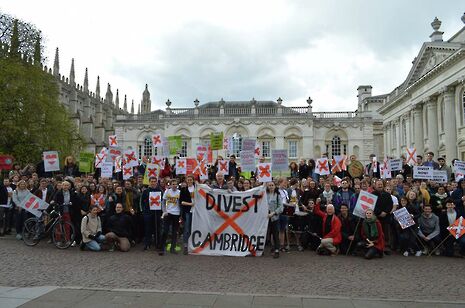Divestment is a mirage – here’s what we can do instead
Divesting is illusory, Cambridge should use the money to invest in reducing the cost of renewables, argues Nicolas Mavreas

About a week ago, a team of Cambridge students released a video accusing the University Council of not accepting a motion (called a “Grace”) for the University of Cambridge to divest.
By divesting, what they want is for Cambridge to reduce its ownership of fossil fuel company stock and bonds from £370 million to effectively zero. Cambridge has a £5 billion endowment and invests it across a variety of sectors.
I assume the goal of the creators of the video is the same as mine: to prevent climate change. But we must consider if divestment really is the best way to push for this? Does it have any practical effects? I would argue that it doesn’t.
“This is based on a fundamental misunderstanding of investment”
When we talk about divestment, we mean selling off our stock and bonds of fossil fuel companies. Who are we selling them to? Other people, funds, institutional investors. Who do we buy stock that is already in the market from? Other people, funds, institutional investors. William McAskill makes this point succinctly in the New Yorker “Well, what happens is that someone who doesn’t have ethical concerns will snap up the bargain. They’ll buy the shares for nine dollars apiece, and then sell them for ten dollars to one of the other thousands of investors who don’t share the university’s moral scruples. The market price stays the same; the company loses no money and notices no difference.”
If we were talking about subscribing to a new stock issue where the money would go directly to the company, it’s a different matter. They would use it to invest in fossil fuel exploration for example, and, it would be significant to oppose Cambridge buying some.
I have been accused that what I say is just investing in fossil fuels now and damaging the climate so we have more money to fix it later. I think this is based on a fundamental misunderstanding of investment. Subscribing to new stock gives money to a company, buying stock on the market does not.
In any case, in the video we are told that the University Council cited their fiduciary duty (their duty as guardians of the University’s funds) to ensure that the University’s funds are invested appropriately as justification for refusal to enforce the Grace.
Divestment is portrayed as a moral imperative and as a way to ultimately lead to the goal of reducing fossil fuel consumption. An argument for it is often stigmatisation of the affected companies, to which great importance is placed. Also, they say, how can Cambridge advocate clean energy while investing in fossil fuels? But given that I've shown divestment in no way reduces the revenue or profits of those companies, it is essentially misguided.
Campaigners argue that the symbolic gesture of divestment has great power. However, given the limited amount of time campaigners can put into influencing the University of Cambridge with respect to climate change, it might be better not to spend it on something with so little practical effect.
Let us use the dividends (in short, a portion of profits which is given to stockholders every year) to set up a ring-fenced fund with a specific name, a catchy name, for research into renewable energy and seed money for renewable start-ups in Cambridge. Then let’s use our position on those companies’ boards to attempt to influence them to spend money on research. We cannot at the same time be diversified (a central tenet of investing) and own a large enough portion of one company. However, hopefully, we can ask for a seat on the board of small companies and attempt to influence how they spend their research money. Furthermore, we could use some of these seats to create a media spectacle with the brand of Cambridge University, although I suspect that would violate our fiduciary duty.
The University of Cambridge is at the forefront of research in engineering. The return on the entire fossil fuel industry currently is about 5 per cent. If we get £18 million per year and use that to back Cambridge students and academics, imagine what we could do, how much we could accomplish. One of the obstacles to fossil fuel replacement is renewable energy cost per unit, and we can help in reducing it.
 Comment / Plastic pubs: the problem with Cambridge alehouses 5 January 2026
Comment / Plastic pubs: the problem with Cambridge alehouses 5 January 2026 News / News in Brief: Postgrad accom, prestigious prizes, and public support for policies11 January 2026
News / News in Brief: Postgrad accom, prestigious prizes, and public support for policies11 January 2026 Theatre / Camdram publicity needs aquickcamfab11 January 2026
Theatre / Camdram publicity needs aquickcamfab11 January 2026 News / Cambridge academic condemns US operation against Maduro as ‘clearly internationally unlawful’10 January 2026
News / Cambridge academic condemns US operation against Maduro as ‘clearly internationally unlawful’10 January 2026 Comment / Will the town and gown divide ever truly be resolved?12 January 2026
Comment / Will the town and gown divide ever truly be resolved?12 January 2026









